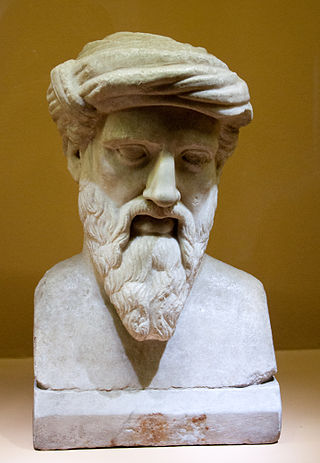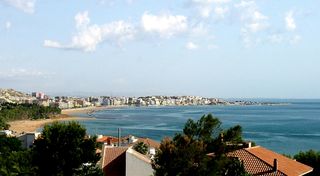Related Research Articles

Pythagoras of Samos was an ancient Ionian Greek philosopher, polymath and the eponymous founder of Pythagoreanism. His political and religious teachings were well known in Magna Graecia and influenced the philosophies of Plato, Aristotle, and, through them, the West in general. Knowledge of his life is clouded by legend. Modern scholars disagree regarding Pythagoras's education and influences, but they do agree that, around 530 BC, he travelled to Croton in southern Italy, where he founded a school in which initiates were sworn to secrecy and lived a communal, ascetic lifestyle. This lifestyle entailed a number of dietary prohibitions, traditionally said to have included aspects of vegetarianism.
The 4th century BC started the first day of 400 BC and ended the last day of 301 BC. It is considered part of the Classical era, epoch, or historical period.
Eudoxus of Cnidus was an ancient Greek astronomer, mathematician, doctor, and lawmaker. He was a student of Archytas and Plato. All of his original works are lost, though some fragments are preserved in Hipparchus' Commentaries on the Phenomena of Aratus and Eudoxus. Spherics by Theodosius of Bithynia may be based on a work by Eudoxus.
This article concerns the period 349 BC – 340 BC.


Aristoxenus of Tarentum was a Greek Peripatetic philosopher, and a pupil of Aristotle. Most of his writings, which dealt with philosophy, ethics and music, have been lost, but one musical treatise, Elements of Harmony, survives incomplete, as well as some fragments concerning rhythm and meter. The Elements is the chief source of our knowledge of ancient Greek music.

Archytas was an Ancient Greek mathematician, music theorist, statesman, and strategist from the ancient city of Taras (Tarentum) in Southern Italy. He was a scientist and philosopher affiliated with the Pythagorean school and famous for being the reputed founder of mathematical mechanics and a friend of Plato.

Pythagoreanism originated in the 6th century BC, based on and around the teachings and beliefs held by Pythagoras and his followers, the Pythagoreans. Pythagoras established the first Pythagorean community in the ancient Greek colony of Kroton, in modern Calabria (Italy). Early Pythagorean communities spread throughout Magna Graecia.
Timaeus of Locri is a character in two of Plato's dialogues, Timaeus and Critias. In both, he appears as a philosopher of the Pythagorean school. If there ever existed a historical Timaeus of Locri, he would have lived in the fifth century BC, but his historicity is dubious since he only appears as a literary figure in Plato's works; all other ancient sources are either based on Plato or are fictional accounts.
The philosopher king is a hypothetical ruler in whom political skill is combined with philosophical knowledge. The concept of a city-state ruled by philosophers is first explored in Plato's Republic, written around 375 BC. Plato argued that the ideal state – one which ensured the maximum possible happiness for all its citizens – could only be brought into being by a ruler possessed of absolute knowledge, obtained through philosophical study. From the Middle Ages onwards, Islamic and Jewish authors expanded on the theory, adapting it to suit their own conceptions of the perfect ruler.

Ocellus Lucanus was allegedly a Pythagorean philosopher, born in Lucania in Magna Graecia in the 6th century BC. Aristoxenus cites him along with another Lucanian by the name of Ocillo, in a work preserved by Iamblichus that lists 218 supposed Pythagoreans, which nonetheless contained some inventions, wrong attributions to non-Pythagoreans, and some names derived from earlier pseudopythagoric traditions.
Dionysius the Younger, or Dionysius II, was a Greek politician who ruled Syracuse, Sicily, Magna Graecia, from 367 BC to 357 BC and again from 346 BC to 344 BC.

In mathematics, the three classical Pythagorean means are the arithmetic mean (AM), the geometric mean (GM), and the harmonic mean (HM). These means were studied with proportions by Pythagoreans and later generations of Greek mathematicians because of their importance in geometry and music.
Timycha of Sparta, was a Pythagorean philosopher mentioned by Iamblichus in his Life of Pythagoras:
The temperance also of those men, and how Pythagoras taught this virtue, may be learnt from what Hippobotus and Neanthes narrate of Myllias and Timycha who were Pythagoreans. For they say that Dionysius the tyrant could not obtain the friendship of any one of the Pythagoreans, though he did every thing to accomplish his purpose; for they had observed, and carefully avoided his monarchical disposition. He sent therefore to the Pythagoreans, a troop of thirty soldiers, under the command of Eurymenes the Syracusan, who was the brother of Dion, in order that by treachery their accustomed migration from Tarentum to Metapontum, might be opportunely effected for his purpose. For it was usual with them to change their abode at different seasons of the year, and they chose such places as were adapted to this migration. In Phalæ therefore, a craggy part of Tarentum, through which the Pythagoreans must necessarily pass in their journey, Eurymenes insidiously concealed his troop, and when the Pythagoreans, expecting no such thing, came to that place about the middle of the day, the soldiers rushed upon them with shouts, after the manner of robbers. But the Pythagoreans being disturbed and terrified at an attack so unexpected, and at the superior number of their enemies, and considering also that they must be taken captive, as they were without arms, and had to contend with men who were variously armed,—they found that their only safety was in flight, and they did not conceive that this was foreign to virtue. For they knew that fortitude, according to the decision of right reason, is the science of things which are to be avoided and endured. And this they now obtained. For those who were with Eurymenes, being heavy-armed, would have abandoned the pursuit of the Pythagoreans, if the latter in their flight had not arrived at a certain field sown with beans, and which were in a sufficiently florishing condition. Not being willing therefore to violate the dogma which ordered them not to touch beans, they stood still, and from necessity attacked their pursuers with stones and sticks, and whatever else they happened to meet with, till they had slain some, and wounded many of them. All the Pythagoreans however, were at length slain by the spearmen, nor would any one of them suffer himself to be taken captive, but preferred death to this, conformably to the mandates of their sect. Eurymenes therefore, and his soldiers, were beyond measure disturbed on finding that they should not be able to bring one of the Pythagoreans alive to Dionysius, though they were sent by him for this purpose alone. Hence, having piled earth on the slain, and buried them in that place in a common sepulchre, they turned their steps homeward. As they were returning, however, they happened to meet with Myllias the Crotonian, and his wife Timycha the Lacedæmonian, whom the other Pythagoreans had left behind, because Timycha being pregnant, was now in her sixth month, and on this account walked leisurely. These therefore, the soldiers gladly made captive, and led them to the tyrant, paying every attention to them, in order that they might be brought to him safe. But the tyrant having learnt what had happened, was greatly dejected, and said to the two Pythagoreans, You shall obtain from me honors transcending all others in dignity, if you will consent to reign in conjunction with me. All his offers however being rejected by Myllias and Timycha; If then, said he, you will only teach me one thing, I will dismiss you with a sufficiently safe guard. Myllias therefore asking him what it was he wished to learn; Dionysius replied, It is this, why your companions chose rather to die, than to tread on beans? But Myllias immediately answered, My companions indeed submitted to death, in order that they might not tread upon beans, but I would rather tread on them, than tell you the cause of this. Dionysius therefore, being astonished at this answer, ordered him to be forcibly taken away, but commanded Timycha to be tortured: for he thought, that as she was a woman, pregnant, and deprived of her husband, she would easily tell him what he wanted to know, through fear of the torments. The heroic woman, however, grinding her tongue with her teeth, bit it off, and spit it at the tyrant; evincing by this, that though her sex being vanquished by the torments might be compelled to disclose something which ought to be concealed in silence, yet the member subservient to the developement of it, should be entirely cut off. So much difficulty did they make 140 in admitting foreign friendships, even though they should happen to be royal.
The Epistles of Plato are a series of thirteen letters traditionally included in the Platonic corpus. With the exception of the Seventh Letter, they are generally considered to be forgeries, although many scholars even reject the seventh.They were "generally accepted as genuine until modern times"; but by the close of the nineteenth century, many philologists believed that none of the letters were actually written by Plato.
This page is a list of topics in ancient philosophy.
The musical system of ancient Greece evolved over a period of more than 500 years from simple scales of tetrachords, or divisions of the perfect fourth, into several complex systems encompassing tetrachords and octaves, as well as octave scales divided into seven to thirteen intervals.
Archytas of Mytilene was a celebrated musician of ancient Greece. In his "Life of Archytas", Diogenes Laërtius says that there were four, perhaps five men of this name; Archytas of Tarentum, a polymath and disciple of Pythagoras, was the main subject of the biography, but Diogenes mentions Archytas of Mytilene second, and relates an anecdote about the musician: that once when criticized for speaking too softly, he replied, "my instrument speaks for me".
Carl Huffman is an American classical scholar and Professor Emeritus of Classical Studies at DePauw University. He is known for his works on ancient Greek philosophy.
References
- ↑ Lundström, Vilhelm (1962). Eranos: acta philologica Suecana. V. Lundström. p. 12. Retrieved 14 February 2011.